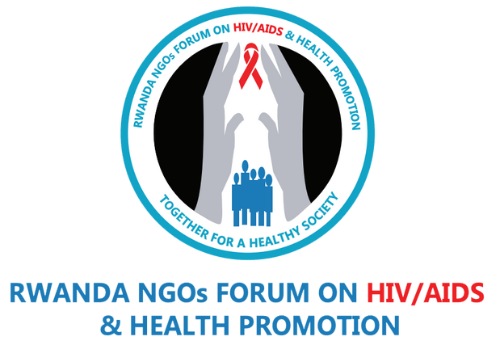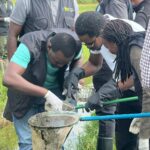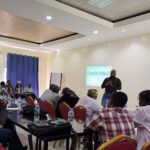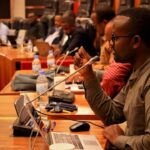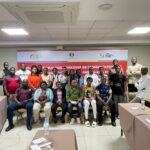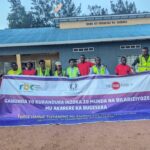From Kigali to the World: How Rwanda NGOs Forum Took Center Stage at IAS 2025
“Our [Rwanda NGOs Forum] participation at IAS 2025 reinforced a simple truth: sustainable progress in the HIV response starts with those most affected, at risk, affected, or infected. By centering key and vulnerable populations in research, policy, and programming, Rwanda NGOs Forum is not just contributing to the conversation; we’re actively helping and contributing to redefine it.” Mrs. Kabanyana Nooliet, Executive Director, RNGOF on HIV/AIDS & HP
From July 13 to 17, 2025, Kigali became more than a host city; it became a voice for African-led HIV science and community power, hosting IAS 2025, the 13th International AIDS Society Conference on HIV Science. The conference welcomed more than 4000 participants, including researchers, policy-makers, program implementers, and community leaders, in person and virtually, to showcase cutting-edge innovations and resilience, define the HIV response, and commit to protecting remarkable gains made in over 40 years of this pandemic worldwide.

During the IAS 2025, Rwanda NGOs Forum on HIV/AIDS and Health Promotion (RNGOF on HIV/AIDS & HP) has been a leading local CSO umbrella advocating for equitable, inclusive, and evidence-based HIV responses, specifically for high-risk groups and key and vulnerable communities, including female sex workers (FSWs), men who have sex with men (MSM), people who use/inject drugs (PWUD/PWID), people with disability (PWD) and adolescent girls and young women (AGYW). Our participation in the IAS 2025 Conference represents a significant milestone not only for the organization but also for Rwanda’s civil society sector at large.
Participation in the IAS 2025 offered an unprecedented opportunity to showcase home-grown innovations, research, and community-led strategies on a world stage. Beyond recognition, it marked Rwanda’s growing leadership in health equity, key population programming, and community-centered approaches to HIV prevention and treatment.
Our participation has been active, proudly demonstrated by the following distinguished engagements:
I. Side Event on 13th IAS Conference on HIV Science: “Civil Society Meeting in the support to the Global Fund’s Eighth Replenishment 2027-2029”
Held on 14 July 2025 at at Kigali Serena Hotel alongside the 13th IAS Conference on HIV Science, this civil‑society high-level side event gathered +100 participants from various stakeholders from Rwanda and across the world including Government representatives, Development Partners, Civil Society Organizations, Private Sector Partners, international organizations, key‑population networks, youth leaders and media, to share updates with key stakeholders and mobilize their commitment to meaningfully engage in the 8th Replenishment of the Global Fund to fight HIV, TB and Malaria. It was co-organized by RNGOF, GFAN Africa, UNAIDS-Rwanda, the Rwanda Ministry of Health (MoH), Rwanda Biomedical Centre (RBC) under the financial support of the Global Fund.

The session galvanized CSOs to mobilize political will and financing commitments, underscoring domestic resource mobilization (DRM) and public-private partnership (PPP). It placed civil society at the forefront of shaping sustainable HIV, Malaria, and TB financing in Africa, leading up to the Global Fund’s 8th Replenishment. Watch the event video here.
II. RNGOF on HIV/AIDS & HP spearheaded the development and submission of 16 scientific abstracts, built upon local evidence and community-based research implemented. These abstracts explored key themes, including the health-seeking behaviors of key populations, gender-responsive programming, substance use and HIV risk among PWUDs, and strengthening the continuum of care for key and vulnerable populations.
Among these 16 scientific abstracts developed and submitted, six abstracts, representing 37.5% were accepted by IAS 2025 scientific committee members, including three poster presentations and three e-posters as detailed below:
1. Poster Presentations
- The role of law enforcement in reducing HIV and HCV risk among PWUDs
- Comparative Study on Substance Use and HIV Risk Among PWUD/PWID in the City of Kigali
- Gender-Responsive Interventions for HIV Prevention and Care: Lessons from Rwanda
2. E-Posters:
- Health-seeking behavior among key populations remains a challenge due to stigma and discrimination
- Strengthening the Continuum of Care for Key Populations: Insights from Female Sex Workers (FSWs)
- Risk factors and behavioral patterns contributing to HIV susceptibility among people who use drugs (PWUDs).
These works reflected the organization’s commitment to data-driven and evidence-based advocacy and efforts to address health inequities and social determinants affecting vulnerable communities.
III.Scholarships for In-Person Representation:

All six abstract presenters received full scholarships sponsored by the Rwanda Biomedical Centre (RBC), enabling them to attend IAS 2025 in person, underscoring a solid collaboration between the 2 institutions and their dedication to promoting and showcasing local expertise on global stages. Our physical presence facilitated in-person abstract presentation, maximum participation in conference sessions, networking opportunities, learning experience, and representation in high-level dialogues. All presented abstracts can be found here.
“Being both an IAS 2025 participant and abstract presenter was genuinely rewarding. It was such an opportunity to personally share groundbreaking findings on people who inject drugs (PWID) study and showcase the impactful HIV interventions led by our team at Rwanda NGOs Forum. I hope we continue to access global platforms like this, not just to shine more light on HIV interventions, but also to showcase our exceptional contributions in tackling Malaria, TB, NTDs, NCDs, SRHR, and other pressing health and human right challenges faced by high-risk groups, key and vulnerable populations in Rwanda,” Louis NGABONZIMA, Director of Programs.
IV.Panel Moderation

On Tuesday, 15, from 10:45 to 11:45, our Executive Director, Mrs. Kabanyana Nooliet, moderated an Oral abstract session themed “Advancing equity in the HIV response: Key populations, human rights and quality intervention,” featuring presenters from Myanmar, India, Uganda, Kenya, and Rwanda. Her moderation role reflected our leadership in health and rights-based programming and its influence in advancing equitable HIV responses, especially for Key populations at both national and global levels. A full event coverage can be found here for replay.
V.Strategic Sessions Participation
During IAS 2025, RNGOF on HIV/AIDS & HP actively engaged in over 20 high-level scientific and policy sessions, demonstrating its commitment to elevating civil society perspectives and translating grassroots experiences into evidence-driven advocacy. These sessions were strategically selected to align with our mission and priorities. Below is a detailed account of the key thematic areas and our contributions:
1. Community-Led Monitoring (CLM):
We actively participated in multiple sessions highlighting the power of community-led monitoring (CLM) as a tool for accountability, quality assurance, and health equity. Drawing from our national experience with the community-led monitoring (iCLM) and integrated community-led monitoring (iCLM) for HIV, TB, and Malaria projects, we presented how community feedback loops, scorecards, and participatory data collection helped improve service delivery at decentralized levels.
We emphasized:
- The role of CSOs in generating real-time data to inform policy and programming.
- Challenges of sustaining CLM initiatives in the absence of dedicated funding.
- Success stories of how feedback from PLHIV and key populations led to facility-level service delivery, stigma reduction, and patient care improvements.
2. Digital Health Innovations:
We showcased our work on integrating mHealth solutions into key population programming and civil society monitoring in digital health-focused panels and presentations. We highlighted the use of SMS-based feedback tools and mobile dashboards to:
- Track ART refill gaps among key populations.
- Monitor PrEP uptake in real time.
- Facilitate digital literacy for CHWs, peer educators, and communities at large.
We also discussed the ethical implications of data collection and digital surveillance, advocating for community consent, data ownership, and security safeguards.
3. Key Populations and Structural Barriers:
In sessions focused on the rights, health access, and resilience of key populations (KPs), we contributed powerful insights based on our programming with female sex workers (FSWs), men who have sex with men (MSM), people who use drugs (PWUDs), and transgender communities.
We shared:
- The negative impact of stigma and criminalization on service uptake.
- Programmatic successes using the peer education system and safe spaces.
- Evidence from recent studies on how punitive laws exacerbate HIV vulnerability.
These sessions allowed RNGOF to advance policy reform narratives and align with regional coalitions advocating for decriminalization and human rights-based responses, especially for PWUD in Rwanda.
4. Strengthening Health Systems:
Our engagement in health systems strengthening sessions centered on the intersection of civil society action, health equity, and sustainability. We shared evidence on:
- The importance of community voice and meaningful engagement in designing HIV service delivery models.
- Barriers faced by CSOs in accessing domestic funding streams.
- The role of public–private partnerships in bolstering service continuity for marginalized groups.
Additionally, RNGOF emphasized the urgent need for inclusive governance, where CSOs remain involved in decision-making for national health planning, ensuring the voices, needs, and priorities of the community members they serve are heard.
Impact and Significance
Our participation in the IAS 2025 was not merely symbolic, but transformational. The accepted abstracts, high-level panel contributions, and side events elevated Rwandan civil society’s voice in shaping global HIV priorities, especially for high-risk groups and key and vulnerable communities, including female sex workers (FSWs), men who have sex with men (MSM), people who use/inject drugs (PWUD/PWID), people with disability (PWD) and adolescent girls and young women (AGYW).
Our insights on stigma, service delivery, harm reduction, and gender-responsive programming resonated with international audiences, influencing discussions on HIV financing, decriminalization, and health system strengthening and resilience. Moreover, the IAS 2025 conference experience catalyzed internal capacity building within Rwanda NGOs Forum, encouraging greater engagement in operational research and global knowledge exchange.

Building on the Momentum to Shape the Next Move
Our engagement at IAS 2025 marked a turning point in our journey, from supporting national HIV efforts to influencing global health discourse. The accepted abstracts, strategic panels, and civil society convenings were not just milestones; they were a statement of readiness and capacity. As we move forward, we are committed to translating this global visibility into more profound local impact. This means expanding our operational research, publishing research papers, strengthening community feedback mechanisms, and supporting civil society organizations to become even stronger advocates for equity and innovation.
We call on partners, donors, and stakeholders to join us in this next phase by investing in community-led monitoring, collaborating on policy-shaping research, and co-creating interventions that place people most affected, at risk, infected, or impacted by HIV at the centre. Together, we can ensure Rwandan voices continue shaping global responses, not from the margins, but from the frontlines.

